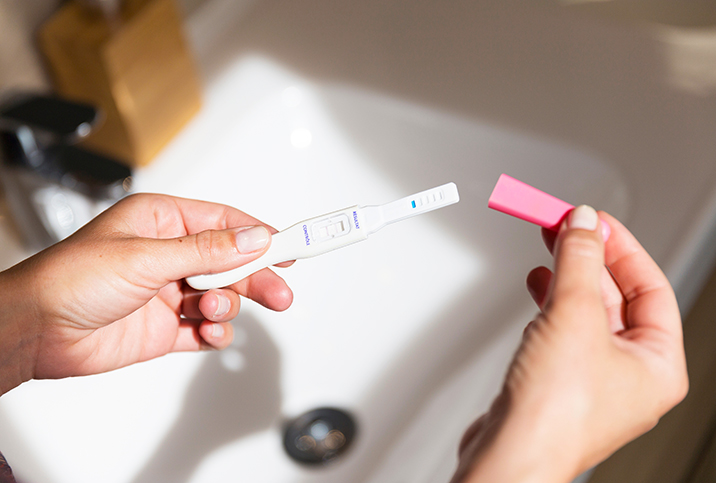How PCOS Can Affect Your Fertility

Pregnancy is a huge milestone, as it marks the journey into motherhood. Building a family is the start of a new chapter, and for many women, it's an exciting and joyous time. However, it's not always easy to become and remain pregnant, with about 12 percent of women experiencing difficulties, according to the Centers for Disease Control and Prevention. And for women with polycystic ovarian syndrome (PCOS), fertility can be even more challenging.
What exactly is PCOS?
According to the U.S. Department of Health and Human Services Office on Women's Health, polycystic ovarian syndrome is a common health problem that affects about 5 to 10 percent of women during their childbearing years (ages 15 to 44). PCOS causes an imbalance of the reproductive hormones, creating multiple problems in the female reproductive system. Women may begin to see symptoms emerge around the time of their first period, but sometimes the syndrome goes undiagnosed until they attempt to conceive.
The cause of PCOS is unknown. However, doctors can discuss your past medical history, perform exams and use your symptoms to make a diagnosis, as the condition varies from person to person. The most common symptom is irregular or prolonged menstrual periods. Heavier periods often are a byproduct since the uterine lining doesn't shed regularly. Another indication is the presence of excess androgens, a "male" hormone, in the body. Women's bodies naturally produce low levels of these hormones; in surplus, it can disrupt the menstrual cycle by causing fewer periods. Lastly, there's the presence of ovarian cysts. These fluid-like sacs, or follicles, surround your eggs, resulting in irregular ovary function.
The name can be misleading because not everyone with PCOS develops cysts. However, most women with PCOS struggle to develop mature eggs or have problems releasing them. Without mature eggs, ovulation isn't triggered—another reason why periods are irregular. Imbalanced ovulation negatively influences the rest of a woman's reproductive hormones, which are all needed to carry out the processes of ovulation, menstruation and pregnancy.
Fertility issues you can expect with PCOS
Since polycystic ovarian syndrome alters the natural biological processes of pregnancy, fertility issues are relatively common. PCOS isn't uniform, so its effect on your fertility can present in various ways. A diagnosis of polycystic ovarian syndrome doesn't mean you won't be able to become pregnant, but there will be extra steps involved on your road to motherhood.
Most women with PCOS struggle to develop mature eggs or have problems releasing them.
Ovulation issues are the main reason why fertility problems occur. Increased androgen levels in the body produce more testosterone. An influx of testosterone creates an imbalance that prevents ovulation from occurring or decreases ovulation due to the inability to produce mature eggs. It also makes it harder for mature eggs to implant on the uterine wall since the uterine lining can develop improperly. Most important, menstrual cycles are irregular and can't be easily tracked. Unpredictability in ovulation and menstruation makes it more complicated to gauge when the best time is to become pregnant.
Fertility issues for women with PCOS go beyond trying to conceive, as it's also much harder to remain pregnant. There's an increased likelihood of miscarriage, premature birth, gestational diabetes and pregnancy-related high blood pressure. With threats of complications, it's essential to work with your physician to monitor symptoms throughout the pregnancy.
What does the treatment process look like?
Thankfully, PCOS is a commonly treatable fertility issue, and many women go on to have successful pregnancies and healthy babies. There are several treatment options available, depending on how severe your symptoms are.
Lifestyle
This is probably the easiest way to manage your PCOS. Healthier eating and regular exercise can greatly improve your symptoms and your ability to become pregnant. Keeping your BMI in normal range is important, as obesity can lead to hormonal imbalances with excess estrogen and a lack of ovulation. Track your cycle to the best of your abilities and plan sex around your ovulation periods for the optimal chance of conceiving.
Medication
Many women need fertility medications to increase their chances of pregnancy. Your doctor might perform fertility tests to check your hormone levels and decide which medication is best suited for you. These medications can help regulate your menstrual cycle, stimulate your ovaries and/or trigger ovulation.
In vitro fertilization (IVF)
When medication doesn't work, in vitro fertilization is the next option. With IVF, the egg is fertilized outside the body and later implanted into your uterus for development. It will give you a higher chance at a successful conception. This is an expensive procedure and can become costly if multiple rounds are needed.
Surgery
Surgery tends to be a last resort and is recommended as a course of treatment less often. This method changes your hormone levels for about six to eight months through a process called ovarian drilling. In this procedure, small holes are drilled into the uterus with a laser or a thin needle heated with electricity.
If you've been diagnosed with PCOS, talk with your doctor to help narrow down which option is best for you.


















